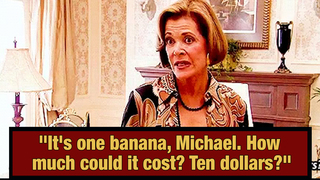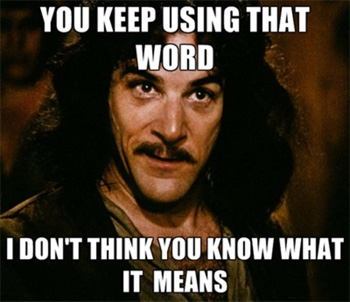5 Famous Jokes Everybody Manages To Screw Up

Jokes are the most important form of communication we have, and many are strongest the moment they're first told. Some get even better with repetition, and many are repeated till a single line turns into a hollow husk of a catchphrase that people apply endlessly, with all the original genuine humor lost. This is how a joke dies. It kills the jokes even harder than explaining jokes, which is what we're about to do right now in a cold attempt to once again tell the world they're wrong.
"It's One Banana, Michael. How Much Could It Cost? Ten Dollars?"
How People Use It:
Don't Miss
Every time you hear a big business or administration official underestimating how hard it is to get by when you're poor, commentators will pull out this classic Lucille Bluth quote. Lucille had no idea how much a single banana costs, having never bought one herself or even gone grocery shopping at all. And when you put mega-millionaires in charge of public policy, you get people just as clueless screwing things up for everyone.
But That's Not What The Joke Was.
Lucille wasn't underestimating how much food cost. She was overestimating. Which is actually the more likely mistake when you're rich. So, it might be more apt to jump in with this quote when someone rich gives MORE money than expected. Like, say, when the government came up with a $600 per week unemployment bonus, and only later realized, "wait, that's twice what some of these people made working fulltime?" It might not make for a very funny observation -- "Congress gives us so much money!" isn't really a crowdpleasing line on the stand-up circuit -- but it would be an apt use of the quote, dammit.
The original quote wasn't about Lucille being evil though stinginess, like every single person who gets hit with the meme today. Sure, the Bluths are rich criminals, not so different from the pre-White House Trumps, but this joke works so well because it portrays her as out of touch in a way that's oblivious yet in this moment not cruel. She imagines the poor must be closer to her level than they actually are. Kind of like how "let them eat cake" was such a good quote to invent (Marie Antoinette didn't actually say it) for summing up the French royals being clueless, rather than "they can get by on one slice a day" or something.
The other takeaway here is that when you hear someone rich greatly underestimating expenses, it's likely not just because they're out of touch. If they were, they'd be overestimating, like Lucille. No one over in McDonald's (or in the Let's-Set-the-Minimum-Wage Committee) said to themselves, "I think people generally pay $20 per month for health insurance, so let's calculate a salary based on that." Whoever filled out that budget above knew it was ridiculous, but they fudged the numbers anyway ... which is something a Bluth would totally do, to be fair.
"Shut Up And Take My Money!"
How People Use It:
Did that amazing new game get announced, and you want it right away? Or some shiny and whirring new bit of electronics? How about a proposed invention, something that might never even really come into being, but you need it, and you need it now? Only one GIF can sum up your feelings.

When we liken ourselves to Fry from Futurama here, we're being a little self-aware. We know we're being overenthusiastic, just like dopey Fry. But we gladly assume that role. Because the product is just that good!
But That's Not What The Joke Was.
In the show, Fry isn't saying this about a good product. He's saying it about a bad product. The joke isn't that he's already sold on it, so he shushes the salesmen from talking it up further. The joke is that he's already sold on it, so he shushes the salesmen from explaining the bad item's flaws.
This was from the episode "Attack of the Killer App." Early into the show's revival, before really getting their groove back, the writers wanted to mock the iPhone, so with an uncharacteristic lack of metaphor, they had characters just list out some flaws of the actual 21st-century product. It wasn't a strong episode, but Fry's line made for a great joke. This was how the exchange went down:
Sales guy: "It's $500, you have no choice of carrier, the battery can't hold a charge, and the reception isn't very ... "
Fry: "Shut up and take my money!"
And yet we use this meme for products we think are actually good. It's so strange. You might as well post a reply saying, "I'd like to exchange my cow for THOSE magic beans!" Um, yeah, that certainly was a memorable bit from a story about someone doing a transaction, but the point of the story you're referencing is the purchase was a bad idea. Though, I guess the beans paid out for Jack in the end, but only because he became a thief and murderer, and is that really want you want for yourself?
"Up To Eleven"
How People Use It:
In This is Spinal Tap, the wild rock band we're following shows off their amps, with dials that run from 0 to 11 instead of just 0 to 10. And boom, we got ourselves a new phrase for when anything pushes absurdly past a normal limit. TV Tropes, for instance, officially uses "Up to Eleven" for this -- if something is crazy and then goes even further than crazy, that's up to eleven!

Here, Doctor Who characters kill a giant monster by pushing a pipe organ up to eleven.
But That's Not What The Joke Was.
If you're making a comedy about a crazy rock band, you say they play their music 110% as loud as the competition, and this why they succeed ... that might work as a joke. Could be really funny even. But that's not what happens in This is Spinal Tap.
Because the number of notches on a dial has nothing to do with how loud an amp plays. Amplifiers come in all sizes, with bigger amps running at higher wattages, and by convention, all the little dials marking volume and gain are divided into ten increments. Spinal Tap's amp dial divides into eleven increments. That doesn't mean it's any louder than otherwise. Rocker Nigel Tufnel just thinks it does because he's an idiot.
The movie explains this for us, through the interviewer talking to Nigel (this was never supposed to be an obscure joke you have to be a musician to understand). "But does that mean it's louder?" the interviewer asks, and the singer can only say, "Yeah, because it goes up to 11." "Why don't you just make 10 louder and make 10 the top," asks the interviewer, but Nigel still doesn't get it. It's like Paul Rudd's character in Anchorman saying “60% of the time, it works every time” -- if we all started repeating that phrase unironically to call stuff highly effective.
Maybe we're all Nigels and would fall for the same gimmick. Marshall (the amp manufacturer mentioned in the movie) soon came out a 100-watt amp whose gain dial boasted TWENTY notches. This was an extra loud amp, thanks to a bunch of features you really do have to be a musician to understand, but the extra 10 divisions on the dial did absolutely nothing to contribute to the loudness. Still, actor Christopher Guest was on hand at the launch in-character as Nigel Tufnel to assure us that this was the best amp ever, because 20 is 9 more than 11.

"You Keep Using That Word, I Do Not Think It Means What You Think It Means"
How People Use It:
Someone misuses a word. "Literally" may be the most common word for people to fumble with, though "ironic" is a close competitor. And did you know "disinterested" does not mean uninterested, and "simplistic" does not mean simple? Or what about "bemused"? Actually, it's safest never to use the word bemused; whichever meaning you're convinced it has, it's really bound to be the other one.
Anytime someone misuses a word, or anytime a discussion of misused words comes up, expect an onlooker to chime in with this quote from The Princess Bride. Remember cool Inigo Montoya owning Wallace Shawn, who clearly didn't know the meaning of the word "inconceivable"? Well, now you're the cool one, and the other person's a sniveling nitwit. Score!

But That's Not What The Joke Was.
Vizzini in The Princess Bride knows the meaning of the word inconceivable just fine. It's just that he's faced with a series of things that, despite previously being inconceivable to him, really do happen -- Westley somehow managing to track them, Westley managing to scale the cliff, and Westley continuing to climb even after the rope is cut. The joke isn't that he's ignorant about the meaning of words (he's a smart character). The joke is his expectations repeatedly getting shattered. Inigo is dryly telling him to expand his beliefs on what is possible, not correcting semantics.
This phrase becoming a meme is kind of like if "There is no spoon" from The Matrix became a meme people bring up every time they see a picture of someone eating with their fingers. Yeah, there's no spoon in that pic, you are correct. But that's so far from what the movie line is about that you probably don't have a good reason to reach for that quote right at this minute.
"Nobody Expects The Spanish Inquisition!"
How People Use It:
In the 16th century, when Queen Joanna the Mad ruled over what we now call Spain, interrogators went to Portugal to capture Jews. To escape persecution (and possible death), Jews in Portugal had to hide their faith while still privately staying true to it. The Inquisition had various ways of identifying Jewish homes, one being that Christians tended to hang pork sausages outside, so if sausages were missing, that household might not be Christian at all. In the town of Mirandela, Jewish families created their own kosher sausage that looked like pork, so they could hang sausages outside and fool casual hunters who passed.

There, that's a bit of historical knowledge for you. And if we left the article at that, you can bet some reader would show off their wit by replying with a comment: "Nobody expects the Spanish Inquisition!" Hilarious. Because it's a reference. To a Monty Python sketch.
But That's Not What The Joke Was.
It has been said that puns are the lowest form of humor. That is untrue. Puns can be very funny. The lowest form of humor in fact consists of reworking a known phrase by replacing the words with more formal language (meanwhile, the highest form of humor of course is when one speaker thinks they're talking about sex, but the other speaker is talking about something else entirely). However, the second-lowest form of humor is, without a doubt, simply referencing a known piece of comedy. Not playing with the reference in any way, or drawing any kind of unexpected connection between the original bit and what you're now talking about, but just quoting an orphaned punchline directly and expecting people to enjoy that.
As with all references like this, you aren't making a joke at all, just saying something other people recognize. (Fine, that's what a lot of memes are.) But what's exasperating here is the actual setup for the punchline is completely forgotten, if it was ever understood at all.
The basis for the sketch is the phrase "I didn't come here expecting the Spanish Inquisition," a facetious way of pointing out someone's questioning you more intently than is reasonable. Type that line into Google, and from the search results, you'd swear that Monty Python invented it. But it was already a common figure of speech before the sketch. Here is it from a 1949 book, and even today, you can sometimes get away with using it without it turning into a Monty Python reference. The sketch only works because the audience considers it a normal phrase, right up until the Inquisition actually appear and turn it on its head. And then the sketch premise shifts repeatedly because that's how Monty Python stuff works, but still, you're supposed to know the line in a non-Python context to find the Inquisition's arrival funny.
Of course, people can turn any line into a meme regardless of the original context -- again, that's what a meme is -- but this one gains no humorous additional meaning when used as a meme, and its original status as a punchline is lost. It's kind of like if you had a conversation like this:
You: "And then she said we should get a dog."
Your dumb friend: "That's what she said!"
You: "What?"
Your dumb friend: "That's what she said. Like Michael Scott."
You: "But that's not ... and anyway, that joke isn't even just from The Office, it's --"
Your dumb friend: "I said 'That's what she said.' Don't you know 'that's what she said'?"
Passing moron: "Oh yeah, that's what she said. Ha, ha. Nice!"
Follow Ryan Menezes on Twitter for other stuff no one should see.